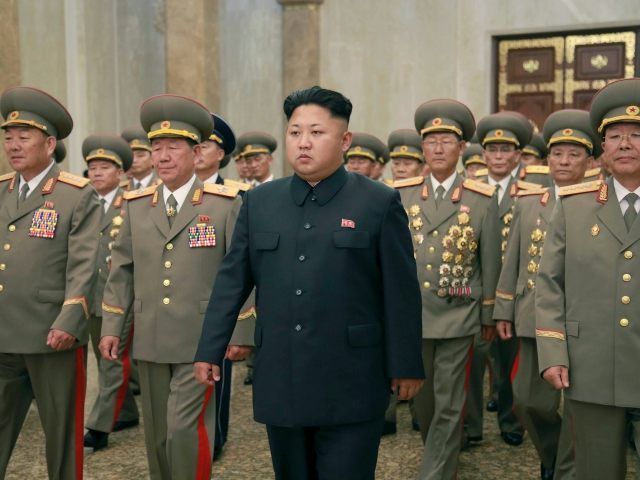The U.S. State Department has called for North Korea to release three American citizens – who were taken hostage by the communist government on various charges of espionage and threatening the repressive Kim regime – the same week American Otto Warmbier, 22, was pronounced dead shortly after being freed after a year in captivity in Pyongyang.
In a statement Tuesday, spokeswoman Heather Nauert explicitly laid the blame of Warmbier’s death on the North Korean government, adding, “we want to see three other Americans who are unjustly detained brought home as soon as possible.”
Warmbier was arrested in March 2016 on charges of tampering with a communist propaganda poster and, according to the state’s communist authorities, fell into a coma shortly after being sentenced to fifteen years of hard labor. He was released last week on humanitarian groups and his parents announced his death on Monday, with doctors noting he suffered “extensive brain damage” they could not trace to any specific cause.
The State Department did not clarify what policies the United States will pursue to free the three Americans. The three Nauert referred to are all of South Korean descent: Kim Dong Chul, a businessman arrested for “spying” for South Korea in 2016; Tony Kim, a professor arrested for “criminal acts of hostility;” and Kim Hak-song, a colleague of Tony Kim’s also arrested for “criminal acts.”
Both Tony Kim and Kim Hak-song worked teaching at the Pyongyang University of Science and Technology, a Christian-run institution that provides full higher education to the children of the nation’s communist elite. While the Kim regime needs the university to educate its future leaders, university workers are required to avoid any religious or political statements when in front of students and cannot expose them to non-communist or religious thought.
During the White House press briefing Tuesday, Press Secretary Sean Spicer told reporters that the Trump administration “will continue to apply economic and political pressure, and try to continue to work with our allies” on the North Korean issue. “We’ve had, I think, positive movement on China over the past five months of this administration, and we’ll continue to work with them and others to put the appropriate pressure on North Korea to change this behavior and this regime.”
President Trump appeared to refute that claim on Twitter later that day, writing, “While I greatly appreciate the efforts of President Xi & China to help with North Korea, it has not worked out. At least I know China tried!”
Spicer also confirmed that the State Department was considering limiting American travel to North Korea for safety reasons but did not comment on how likely such a move would be.
An estimated thousand Americans visit North Korea annually, most taking advantage of predatory tour groups that misrepresent the dangers of being an American in North Korea, which is technically still at war with the United States, as the Korean war never officially ended. Young Pioneer Tours, the group that took Otto Warmbier to Pyongyang, announced Tuesday it would not end its business with North Korea, banning Americans from it tours instead.
The Chinese government rejected the idea of cracking down on companies like Young Pioneer Tours, which mostly operate out of China. In its regular press conference Monday, the Foreign Ministry said it would “stay committed to denuclearization of the Korean Peninsula, peacefully resolving relevant issues through dialogue and negotiation and upholding peninsular peace and stability.”
By Tuesday, following President Trump’s tweet, spokesman Geng Shuang took a more combative stance, repeatedly denying that China had a significant role to play in taming the North Korean regime.
“The crux and the focal point of contention of the Korean Peninsula nuclear issue do not lie with the Chinese side. Settling the peninsula nuclear issue calls for collective wisdom and concerted efforts,” Geng said, later adding, “Like what I said just now, China is not the crux and focal point of contention of the Korean Peninsula nuclear issue. You may think about it: is China the one to blame for the escalation of the tensions on the Korean Peninsula over the recent period?”
China is North Korea’s largest trading partner – responsible for 90 percent of North Korean trade – a fellow communist nation, and a major counterweight to United Nations sanctions on what many argue is the world’s most egregious state violator of human rights.
At least some North Korean officials are changing their rhetoric following Trump’s announcement and Warmbier’s death. “If our demands is met, we can negotiate in terms of the moratorium of such as weapons testing,” North Korea Ambassador to India Kye Chun-yong said Wednesday, the first recent statement suggesting North Korea is willing to negotiate an end to nuclear weapons testing.
The state-run Korean Central News Agency showed no signs of a policy change on Wednesday, however. “The process of the DPRK-U.S. standoff in the first half of the year proves that the U.S. stronger pressure makes Juche Korea more powerful while making the destiny of the U.S. more risky,” a KCNA article read Wednesday. “The strategic position of the DPRK as a nuclear power in the East and rocket power in Asia is becoming more steadfast.”

COMMENTS
Please let us know if you're having issues with commenting.